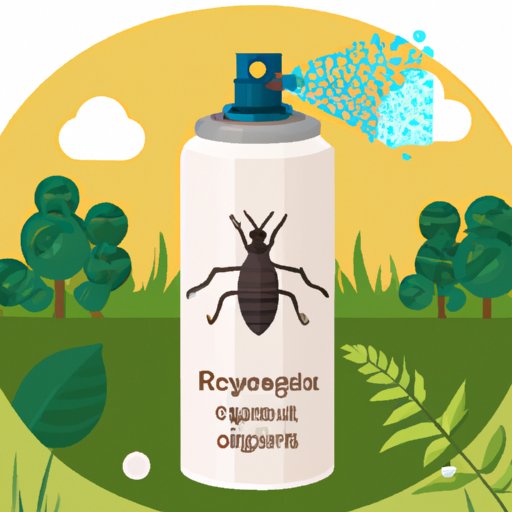Introduction
It’s summertime, which means you’re probably spending more time outdoors. But with that comes the dreaded insects – mosquitoes, ticks, and other pests. Fortunately, there are many products available that can help keep these pesky bugs away. One of the most popular is bug spray. But how does it work? In this article, we’ll explore the chemical ingredients used in bug sprays, the different types of bug sprays, natural alternatives, and their potential health and environmental effects. We’ll also discuss the best ways to apply bug spray for maximum effectiveness.

Chemical Ingredients Used in Bug Spray
The active ingredients in bug sprays are typically synthetic chemicals, such as DEET, permethrin, and picaridin. According to a study conducted by the Centers for Disease Control and Prevention (CDC), DEET is one of the most effective insect repellents on the market. It works by blocking receptors in insects’ antennae that detect carbon dioxide, which is a sign of prey. Permethrin is another common ingredient in bug sprays. It’s a synthetic form of a naturally occurring insecticide called pyrethroid, and it works by disrupting an insect’s nervous system. Finally, picaridin is a synthetic compound that works by blocking the receptors in insects’ antennae that detect smell.

Different Types of Bug Spray
Bug sprays come in a variety of forms, including aerosol sprays, pump sprays, and wipes. Each type has its own advantages and disadvantages. Aerosol sprays are easy to apply and provide quick coverage, but they can be flammable and may contain volatile organic compounds (VOCs). Pump sprays are less flammable and have fewer VOCs, but they require more effort to apply. Wipes are mess-free, but they don’t provide as much coverage as aerosol or pump sprays. Depending on your needs, you can choose the type of bug spray that best suits your situation.
Natural Bug Spray Alternatives
If you’re looking for a more natural alternative to traditional bug sprays, there are several options available. Essential oils, such as citronella, lemongrass, and peppermint, are popular natural insect repellents. They work by masking the scents that attract bugs, making them less likely to come near you. Other natural alternatives include garlic, onion, and eucalyptus oil. These ingredients can be found in various bug sprays and other products designed to repel insects.
Effects of Insect Repellent on Human Health
When used properly, most bug sprays are safe for people of all ages. However, if used improperly, they can cause skin irritation and other health problems. A 2017 study published in the journal Toxicology found that DEET can be toxic when ingested, inhaled, or absorbed through the skin. It’s important to read the label of any bug spray you use and follow the instructions for proper application.

Impact of Bug Spray on the Environment
Bug sprays can have a negative impact on the environment. The active ingredients in bug sprays can pollute waterways and harm aquatic life. Additionally, some bug sprays contain VOCs, which can contribute to air pollution. To minimize the environmental impact of bug sprays, it’s important to use only the amount necessary and not spray directly into open water or onto plants.
Best Ways to Apply Bug Spray for Maximum Effectiveness
When applying bug spray, it’s important to take a few steps to ensure maximum effectiveness. First, make sure the area you’re spraying is free of dust and dirt. This will allow the bug spray to stick to surfaces better. Second, use the right amount of bug spray. Too little won’t be effective, and too much can be dangerous. Finally, the best time to apply bug spray is at dusk or dawn, when insects are less active.
Conclusion
Bug sprays are an effective way to keep pesky insects away. When used properly, they can provide protection from annoying bugs without posing a risk to humans or the environment. However, it’s important to understand the different types of bug sprays and their potential health and environmental impacts before using them. Knowing the best ways to apply bug spray will help you get the most out of your bug repellent and keep you safe from pesky bugs.
(Note: Is this article not meeting your expectations? Do you have knowledge or insights to share? Unlock new opportunities and expand your reach by joining our authors team. Click Registration to join us and share your expertise with our readers.)
